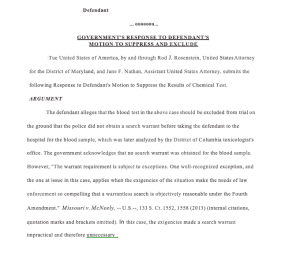Subtotal: $2.00
A Colorado Supreme Court order dealing with the exclusionary rule and driver license DMV
The Department of Revenue, through the Division of Motor Vehicles, revoked a driver’s license, following a hearing officer’s determination that the driver had driven a motor vehicle with a blood alcohol content in excess of the statutory maximum. The district court reversed, holding that the initial stop of the driver’s vehicle was not supported by reasonable suspicion. The court of appeals reversed the district court and held that the legality of the initial contact between the police and the driver was not relevant in the civil administrative proceeding to revoke the driver’s license. The court also held that the exclusionary rule did not apply to suppress evidence of the driver’s BAC. The supreme court holds that, under section 42-2-126, C.R.S. (2011), “probable cause” in the context of the driver’s license revocation statute, as it existed at the time of the hearing in this case, refers to the quantum and quality of evidence necessary for a law enforcement officer to issue a notice of driver’s license revocation, not whether the officer’s initial contact with the driver was lawful. The supreme court further holds that the exclusionary rule did not apply to suppress evidence of the driver’s BAC in the driver’s license revocation proceeding. Accordingly, the supreme court affirms the judgment of the court of appeals.
Appellant Brief on Whether an Illegal Stop Can Affect a License Revocation
Whether or not the exclusionary rule applies in driver’s license revocation proceedings, the express consent statute does not allow the Department of Revenue to revoke a driver’s license pursuant to section 42-2-126 on the basis of a search that itself is the product of an illegal stop and arrest. In this case we argued that, The court of appeals erred in holding that a driver cannot rely on the exclusionary rule to raise the illegality of initial police contact as a defense in a driver’s license revocation proceeding conducted pursuant to section Colorado Law,
Note statute has changed this since the appeal.
Appellant’s Opening Brief
Appellant’s opening brief concerning the case where the appellant is charged with driving under the influence of alcohol, careless driving, resisting arrest and obstruction of police.
Breath Test – Male (Gilpin County)- Criminal Defense Legal Document
Motion to suppress breath test on notion road side tests were taken illegally and arrest were warrantless.
Defendant’s Motion in Limine to Preclude Evidence Pertaining to Impairment Ratings
DEFENDANT’S MOTION IN LIMINE TO PRECLUDE EVIDENCE PERTAINING TO IMPAIRMENT RATINGS
DUI Breath Test Not Certified – Criminal Defense
Motion to suppress DUI breathalyzer results due to fraudulent certification, or lack of certification.
DUI JUROR QUESTIONNAIRE
A jury Questionnaire that can be used in DUI, DWAI and driving while impaired by marijuana. Both Word format and PDF
DUI Trial Preparation Documents
Typically about two percent of cases end up going to a jury trial. For some attorneys, it can go either way; it just depends on the cases. There might be times where ten percent or more of these cases will go to trial.
Some conviction rates were as low as 63 percent while several were 85 to 95 percent. Actual dismissals of charges occurred at rates, when stated, of around 1.5 percent. One country cited about a 10 percent dismissal rate. Rhode Island cites a rate of about 67 percent convictions.
Certain key factors of what happened during a DUI or DWI arrest, can work to get a case dismissed before court or trial. First-time DUI charges are regularly dismissed by prosecution attorneys or the court itself.
When you hire a private DUI lawyer, it’s typically to represent you in DMV proceedings and criminal court. … However, hiring a private DUI attorney (assuming you can afford one) can be well worth it. Of course, when you’re retaining an attorney, you get to decide who that attorney will be.
Government Response to Motion to Suppress and Exclude – McNeely Memo
Government response to motion to suppress and exclude blood sample evidence on the grounds it was obtained illegally without a warned from the hospital.

McNeely Reply Memo – DUI Case File- DUI Case File
Defendant reply memo to governments newly filled memorandum.
Motion for a New Trial – DUI Case File
Motion for new trial regarding DUI case on grounds identification was not requested before arresting defendant.
Motion for Discovery DNA and Laboratory Scientific Evidence
Motion for Discovery DNA and Laboratory Scientific Evidence – DUI Case File
Motion for Discovery Fingerprint Evidence in a DUI Case
Motion for discovery in regards to fingerprint evidence to be used in trial.
A DWI, DUI, or OUI arrest means you’re caught driving a vehicle while “under the influence” of alcohol or drugs. … You can still get a DWI if you’re pulled over for some reason other than erratic driving, by the way. As long as your BAC is 0.08 percent or higher, you can be charged, even if your driving wasn’t affected.
Motion for Discovery of Laboratory Evidence – Toxicology
Motion to enter toxicology reports into evidence relevant to use in trial.











 Request to Reduce Payment for ODR Services and Supporting Financial Affidavit (FINAL)
Request to Reduce Payment for ODR Services and Supporting Financial Affidavit (FINAL)